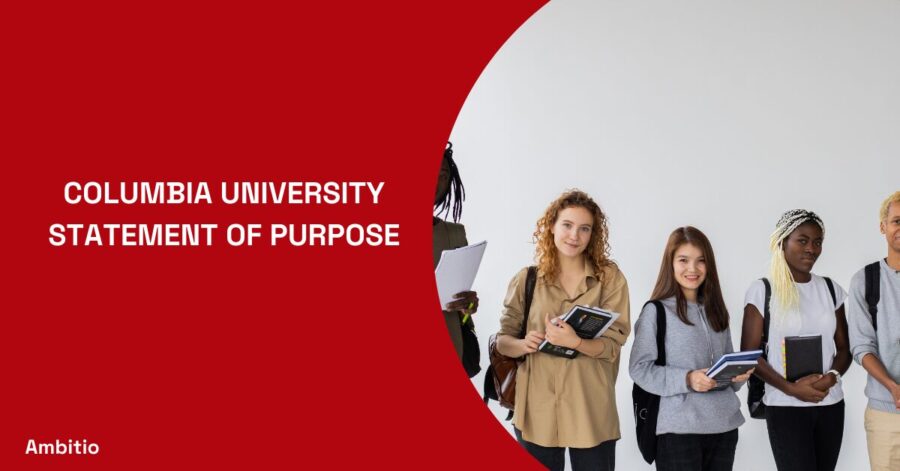13 December 2024
6 minutes read
Columbia University Statement of Purpose

Crafting an effective statement of purpose (SoP) is a crucial step in your journey to becoming a graduate student at Columbia University. This document not only showcases your academic prowess and research ambitions but also reflects your personality and potential to contribute to Columbia’s esteemed academic community.
This blog will guide you through the nuances of writing an impactful statement of purpose for Columbia University’s graduate programs.
Understanding the Role of a Statement of Purpose in Your Columbia University Application
A statement of purpose is more than just an essay; it’s a narrative of your academic journey and a roadmap of your future ambitions. It helps the admissions committee at Columbia University understand who you are beyond grades and test scores.
Starting Your Statement of Purpose: Laying the Groundwork
Understanding Columbia University’s Expectations
Before you begin writing, it’s crucial to understand what Columbia University expects from a statement of purpose. Typically, the university will provide guidelines regarding the length, format, and key points to cover. Adhering to these guidelines is the first step in crafting a successful application.
Researching Graduate Programs and Faculty
Spend time researching the specific graduate program you are interested in. Understanding the program’s strengths, curriculum, and research opportunities allows you to tailor your SoP accordingly. Additionally, identify faculty members whose research interests align with yours and mention how their work inspires you.
Reflecting on Your Academic and Professional Journey
Your SoP should be a reflection of your academic and professional experiences. Think about the courses, projects, internships, and any relevant work experience that have shaped your interest in your chosen field. This reflection will form the foundation of your SoP.
Structuring Your Statement of Purpose for Clarity and Impact
Crafting an Engaging Introduction
The introduction of your SoP should grab the reader’s attention. Start with a compelling story or a clear statement of your academic interests and career goals. This sets the tone for the rest of the essay.
Developing the Body of Your SoP
In the body, delve into your academic background, research experiences, and any professional experiences relevant to your field of study. Discuss specific projects or challenges you’ve tackled and what you’ve learned from them. Link these experiences to the skills and knowledge you wish to acquire at Columbia.
Concluding with Your Future Aspirations
Your conclusion should reiterate your passion for the field and your long-term goals. Explain how a degree from Columbia University will help you achieve these goals and contribute to the academic community.
Highlighting Your Unique Qualities and Experiences
Emphasizing Diversity and Personal Challenges
Universities like Columbia value diversity and unique perspectives. Share any personal challenges you’ve overcome or unique experiences that have shaped your worldview and academic interests. This can include cultural experiences, overcoming adversity, or unusual paths to your academic career.
Demonstrating Passion and Commitment
Your SoP should convey your passion for the subject and your commitment to pursuing a graduate degree. Use specific examples to illustrate your dedication, such as any extracurricular activities, volunteer work, or academic clubs that are relevant to your field of study.
Showcasing Research and Academic Achievements
Highlight any research projects, publications, or academic honors you’ve received. Discuss the significance of your research and how it has prepared you for graduate studies. This demonstrates your ability to contribute meaningfully to Columbia’s academic community.
Addressing Academic Gaps or Weaknesses
Tackling Weaknesses Head-On
If there are any gaps or weaknesses in your academic record, address them honestly in your SoP. Explain the circumstances and, more importantly, how you’ve overcome these challenges or what you’ve learned from them.
Turning Weaknesses into Strengths
Frame your challenges as opportunities for growth. Discuss the skills or insights you gained from these experiences and how they have prepared you for the rigors of graduate study.
Balancing Weaknesses with Strengths
Always balance any discussion of weaknesses with your strengths. Emphasize your resilience, problem-solving skills, and determination, which are valuable traits in a graduate student.
The Role of Extracurricular Activities and Work Experience
Incorporating Relevant Extracurriculars
Include extracurricular activities that demonstrate skills or interests relevant to your field of study. This could include leadership roles in clubs, volunteer work, or participation in academic competitions.
Leveraging Professional Experience
If you have work experience, especially in a field related to your graduate studies, highlight how this experience has enriched your understanding of the field and prepared you for advanced study.
Connecting Activities to Your Academic Goals
Make sure to connect your extracurricular and professional experiences back to your academic goals and how they have prepared you for graduate school at Columbia.
Seeking Feedback and Revising Your Statement
Importance of Feedback
Once you have a draft of your SoP, seek feedback from mentors, professors, or colleagues. They can provide valuable insights into the content and structure of your SoP.
Revising for Clarity and Conciseness
Use the feedback to revise your SoP. Focus on clarity, conciseness, and making sure that each paragraph contributes to the overall narrative of your academic and professional goals.
Final Proofreading
Before submitting your SoP, ensure it is free from grammatical errors and typos. A well-written, error-free SoP reflects your attention to detail and seriousness about your academic pursuits.
Submission and Beyond Final Steps in the Application Process
After crafting a compelling statement of purpose, your journey toward graduate study at Columbia University is far from over. The submission of your application marks the beginning of a new phase, filled with anticipation and preparation. Here, we’ll delve into the final steps of the application process, offering guidance to navigate this critical stage effectively.
Ensuring a Flawless Submission
Double-Checking Application Requirements
Before submission, it’s essential to revisit Columbia University’s application requirements. Ensure that every component, including your statement of purpose, transcripts, recommendation letters, and any supplementary materials, meets the specified criteria. Overlooking even minor details can jeopardize your application.
Technical Aspects of Online Submission
In today’s digital age, most applications are submitted online. Familiarize yourself with the application portal well in advance. Upload your documents in the required format and size. It’s wise to complete the submission process a few days before the deadline to avoid last-minute technical glitches.
Final Review and Submission
Review your entire application, including your statement of purpose, one last time. Check for any typographical errors or omissions. A well-polished application speaks volumes about your meticulousness and professionalism. Once satisfied, submit your application confidently.
Preparing for Interviews and Additional Evaluations
The Possibility of Interviews
Some Columbia University programs may require interviews as part of the application process. These interviews are opportunities to further impress upon the faculty your passion and suitability for the program. They also allow you to ask questions and gain deeper insights into the program.
Preparing for Interviews
To prepare, review your statement of purpose and application, and be ready to discuss them in detail. Also, prepare thoughtful questions about the program and faculty research. Practice common interview questions and scenarios with a mentor or peer to build confidence.
Additional Assessments
Some programs might require additional assessments or submissions, such as writing samples, portfolios, or specific tests. Stay informed about these requirements and prepare accordingly.
Managing the Waiting Period
Staying Informed
After submission, regularly check your email and the application portal for updates. Some programs may communicate additional requirements or updates through these channels.
Coping with the Wait
The waiting period can be stressful. Engage in activities that keep you relaxed and optimistic. This is also a good time to plan for various outcomes, including acceptance, rejection, or placement on a waitlist.
Responding to Offers and Decision Making
Evaluating Offers
If you receive an acceptance offer from Columbia, evaluate it thoroughly. Consider factors like program curriculum, faculty, research opportunities, campus culture, location, and financial aspects.
Decision-Making Process
Deciding on a graduate program is a significant life choice. Consult with mentors, family, and friends. Make a decision that aligns with your academic goals and career aspirations.
Handling Multiple Offers
If you have multiple offers, weigh each program’s pros and cons. Be respectful and professional in your communications with each university. Adhere to decision deadlines to not jeopardize your or other applicants’ opportunities.
Post-Acceptance Steps
Completing Enrollment Formalities
Once you’ve accepted an offer, complete all necessary enrollment formalities. This may include submitting final transcripts, completing financial documentation, and participating in orientation programs.
Preparing for the Transition
Prepare for the transition to graduate study. This might involve relocating, arranging accommodations, and familiarizing yourself with the campus and its resources.
Engaging with the Columbia Community
Before the program begins, engage with the Columbia community. Connect with future classmates, participate in pre-semester activities, and join Columbia’s online forums and social networks. This will ease your transition into graduate life.
Conclusion
In conclusion, your statement of purpose is a critical component of your application to Columbia University’s graduate programs. It’s your opportunity to showcase your academic achievements, articulate your research interests, and demonstrate your potential as a graduate student.
Remember to be authentic, thorough, and reflective in your writing. Your SoP is not just an essay; it’s a reflection of your aspirations and a testament to your readiness for advanced academic study. Good luck!
FAQs
Q1: How long should my statement of purpose be for Columbia University’s graduate program?
Adhere to the word count specified by the university. Typically, this ranges from 500 to 1000 words.
Q2: Can I include extracurricular activities in my statement of purpose
Yes, if they are relevant and demonstrate skills or experiences that contribute to your academic and research goals.
Q3: How important are standardized test scores like the GRE in the application?
While important, they are just one aspect of your application. A strong statement of purpose can significantly bolster your application.
Q4: Should I mention specific faculty members in my statement?
Yes, if their research interests align with yours. This shows you have done your homework and are serious about your academic pursuits at Columbia.
Q5: How can I ensure my statement of purpose stands out?
Be authentic, concise, and clear in articulating your goals, experiences, and why Columbia is the right fit for you. Proofread meticulously to avoid any errors.

You can study at top universities worldwide!
Get expert tips and tricks to get into top universities with a free expert session.
Book Your Free 30-Minute Session Now! Book a call now




























